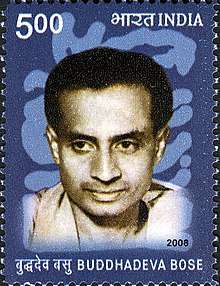Dhusar Pandulipi
Dhusar Pandulipi or Dhusor Pandulipi (transl. Grey Manuscript) is a collection of poems by Jibanananda Das.[1] The book was first published in 1936.[2] This poem collection was the first successful attempt in Bengali language, that did not have Tagorian influence.[3]
| Author | Jibanananda Das |
|---|---|
| Country | India |
| Language | Bengali |
| Genre | poetry |
Publication date | 1936 |
| Media type | |
| Text | Dhusar Pandulipi at Wikisource |
Publication
.jpg)

The book was first published in 1936, however nearly all the poems of the book were published in different magazines by 1930.[4][5] Bengali poet Buddhadeb Bosu was associated with poetry magazine Kallol, and also publshed and edited several notable poetry magazines such as Kavita, Pragati. Many of the post-Tagore literary personalities started their literary career with these poetry journals. Several poems of Jibanananda's Dhusar Pandulipi were first published in Bosu's Kavita magazine. Later Bosu established Kavita Bhavan, a publication and a hang-out for Bengali literary personalities. The first book published by Kavita Bhavan was Jibanananda's Dhusar Pandulipi. Das also dedicated this work to Buddhadeb Bosu.[6]
Das wrote a poem called "Campe" which was first published in Parichay magazine in 1932. Literary critic Sajanikanta Das accused Jibanananda of obscenity for this poem. However Jibanananda did not pay attention to the crirticism and included the poem in the book Dhusar Pandulipi.[5]
Reception
The book is considered as the first matured literary work of Jibanananda Das.[3] Chidananda Dasgupta, in his book Makers Of Indian Literature Jibanananda Das, wrote some of the poems of this collection had a similarity with Rabindranath Tagore's poem "Nirjharer Swapnabhanga".[7] Bengali poet and journalist Samar Sen wrote: ". . . poetic view of poetry will perhaps be irritated with the escape-formula worked out in the last poem of Dhusar Pandulipi, the dream cult and the rest of it.[8]
References
- Zinia Mitra (3 April 2012). Indian Poetry in English: Critical Essays. PHI Learning Pvt. Ltd. pp. 193–. ISBN 978-81-203-4571-3.
- R. Victoria Arana (22 April 2015). Encyclopedia of World Poetry. Infobase Learning. pp. 349–. ISBN 978-1-4381-4072-8.
- Kuśa Satyendra (2000). Dictionary of Hindu Literature. Sarup & Sons. pp. 54–. ISBN 978-81-7625-159-4.
- Clinton B. Seely (1990). A poet apart: a literary biography of the Bengali poet Jibanananda Das, (1899-1954). University of Delaware Press. ISBN 978-0-87413-356-1.
- "বিমূঢ় যুগের 'বিভ্রান্ত' কবি নন জীবনানন্দ". Anandabazar Patrika (in Bengali). Retrieved 18 March 2020.
- "ধূসর পাণ্ডুলিপি - Anandabazar". Anandabazar Patrika (in Bengali). Retrieved 18 March 2020.
- Chidananda Dasgupta (2004). Makers Of Indian Literature Jibanananda Das. Sahitya Akademi. pp. 16–. ISBN 978-81-260-1874-1.
- Nityapriẏa Ghosha (2001). Samar Sen. Sahitya Akademi. pp. 83–. ISBN 978-81-260-1110-0.
External links
- Dhusar Pandulipi at the Internet Archive
- Dhusar Pandulipi at Bengali Wikisource